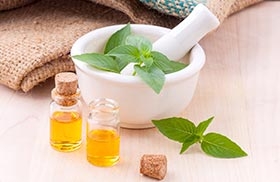Is lemon balm good for the skin?

Lemon balm has many traditional uses. It is commonly used for skincare and the treatment of conditions including sores, acne, cold sores and insect bites.
A popular herb of the mint family, lemon balm is a staple of traditional European medicine. It is known to be an antioxidant and anti-inflammatory with antibacterial qualities. These properties, combined with its pleasant, lemony scent, make it a staple of herbal skincare. It is applied topically in the form of a salve or cream. When used to treat a condition it is rubbed into the affected area three or four times per day.
Skincare
Lemon balm contains natural antioxidants called caffeic acid and ferulic acid. Antioxidants neutralise ‘free radicals’ – oxidising agents commonly created by pollution which cause damage to skin cells. They can cause premature ageing if left unchecked.
Creams containing lemon balm can boost circulation, while the tannin component acts as an astringent, helping to tighten the skin.
The antibacterial qualities of lemon balm help to cleanse pores and reduce the occurrence of blackheads. It is believed to help with healing, which makes it a popular natural remedy for insect bites and stings, cuts, and grazes.
The rosmarinic acid in lemon balm helps to dry oily skin, which can prevent outbreaks: for this reason, many people also believe that lemon balm is effective against acne.
Skin conditions
Lemon balm is also a popular natural treatment for several common skin conditions. As an antibacterial and anti-inflammatory agent, it helps to reduce the swelling and reddening of the skin that is common in conditions including acne, shingles, chicken pox, eczema and psoriasis.
However, it is perhaps best known as a way to combat cold sores, which are caused by the herpes virus (herpes labialis).
It can also be useful against sunburn thanks to two compounds, caffeic acid and ferulic acid. As an anti-inflammatory, lemon balm reduces the inflammation caused by UV radiation.
Did you know?
Lemon balm is available in multiple forms, including salves, supplements, drops, creams, extracts and as a (very expensive) essential oil. You can even grow it in your garden and make your own lemon balm products!
The right delivery method will depend on why you want to use this versatile herb. When choosing a lemon balm product, you should make sure it is from a reputable supplier and contains a pure extract without the addition of cheaper synthetic ingredients.
